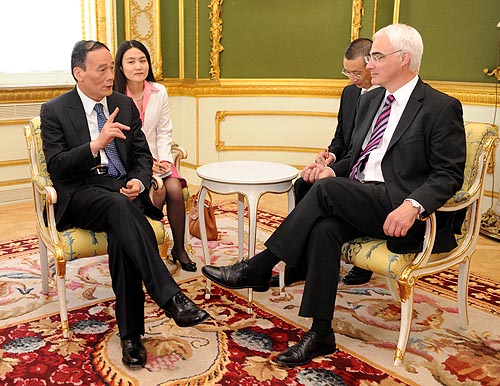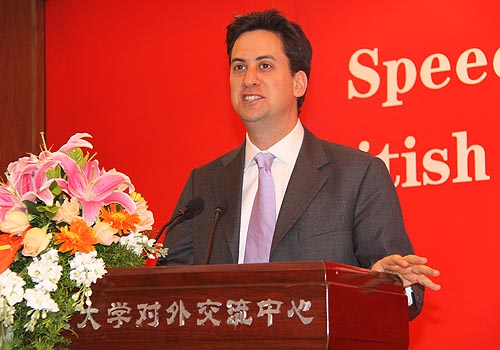|
At the end of 2008, the British Foreign and Commonwealth Office issued "The UK and China: A Framework for Engagement." It is the first such document Britain has issued on its China policy. It was designed to set out a way of thinking about China more widely. Peter Wilson, Political Counselor at the British Embassy in Beijing, recently talked with Beijing Review about the significance of the document for bilateral relations between China and Britain.
Beijing Review: Why did the British Foreign and Commonwealth Office issue "The UK and China: A Framework for Engagement" at the end of 2008? What is the significance of the timing?
 |
|
Peter Wilson (COURTESY OF THE BRITISH EMBASSSY IN CHINA) | Peter Wilson: China has become increasingly important for UK foreign policy. On almost all the big global issues, China's view is critical--economics and trade, climate change, regional stability. So our relationship with China now directly affects many people across the UK in a way that was not true in the past. That's why we wanted to set out a framework, so that the increasingly large number of people who are interested can understand our priorities with China. We wanted to influence the public debate in Britain, and be transparent about our objectives and our commitment to constructive engagement.
On the timing-well, this paper sets out the view not just of the Foreign Office but of the whole government. We started a process of extensive consultation several months before final publication. This was the first time we have ever published a country strategy document in this way, so we took great care over it.
Do you think the framework mainly defines Britain's relations toward China, or rather does it reflect Britain's judgment of contemporary world structure?
 |
|
DIALOGUE: Chinese Vice Premier Wang Qishan holds talks with British Chancellor of the Exchequer Alistair Darling, prior to the second China-Britain Economic and Financial Dialogue at Lancaster House in London on May 11 (ZENG YI) |
 |
|
TALK ON ENERGY: Ed Miliband, British Secretary of State for Energy and Climate Change, delivers a speech to students at Peking University on May 4, during his recent China tour(COURTESY OF BRITISH EMBASSSY IN CHINA) | Both. Bilaterally, our ties are growing all the time. Just to give a few examples: China is the UK's largest export market outside the EU and the United States. There are more foreign students from China in the UK than from any other country. China publishes more joint scientific research papers with the UK (3,000 last year) than with any country but the United States. We work extensively with China on climate change. But Premier Wen [Jiabao] also said, when he was speaking with the Prime Minister [Gordon Brown] at a press conference in London on February 2, that "the China-UK relationship has gone beyond the bilateral stage, and is having an increasingly important impact on the whole world." We agree with this. We are both permanent members of the UN Security Council. We worked closely together in the run-up to the G20 summit in London on April 2. The issues we discuss now go well beyond the bilateral.
According to the content of the framework, what are the differences between Britain's current judgment of and approach to China-Britain relations and those in the past?
I think the real difference is in how the relationship has broadened. A decade ago, when I was last in the British Embassy in Beijing, we had fewer shared interests. As China's economy has grown, so has its list of priorities, and its engagement with the outside world. Interest in China within the UK has also grown, rapidly. There has always been a strong government interest. But we now have more than 500 schools teaching Mandarin, stories about China in our media every day, and last year's exhibition of the Terracotta Warriors from Xi'an broke all records for the British Museum and was seen by almost a million people.
Among the major judgments of the framework, which enjoy consensus between China and Britain, and which require more negotiation in the future?
You should ask the Chinese Government that question, too! But as I see it, the areas of consensus outweigh the differences significantly. We do have very different political systems, and we have differences over human rights, which we do and should discuss. But a key issue is our respective directions of travel. China and the UK have both changed a great deal in the last 30 years. The pace of change here in China is probably the most rapid for any large country in history. The relationship between us over those years has grown progressively closer. I am optimistic that this will continue, as we see our long-term as well as our short-term interests coincide.
What is the significance of the framework in guiding the future development of China-Britain ties?
The framework was designed to inform those in the UK who deal most closely with China, to set out a strategy for the government and a way of thinking about China more widely. There is a broader debate in the EU about how to increase our multilateral ties as well, and we hope this document has an impact on that debate as well as our own.
In the near future, what does Britain plan to do to strengthen China-UK cooperation in line with the framework?
Let me give you a couple of very immediate examples. Ed Miliband, our Cabinet Secretary for Climate Change and Energy, just visited China--he has just been discussing our respective positions in advance of the UN Copenhagen summit in December, where China's position will be critical to our global efforts to tackle dangerous climate change. He also went to Gansu [Province], seeing some of the effects climate change is having now. In early May, Vice Premier Wang Qishan left Brussels for Edinburgh and London, for the second round of the Economic and Financial Dialogue between our two countries. These two high-level visits represent two key areas of exchange between us right now.
|
